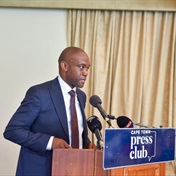
I met a pretty girl with striking features at church, a cross between Liya Kebede and Iman. Immediately, upon stealing a look at her, well, admiring her, really, I surmised that she was east African, probably Ugandan or Rwandese.
My guess, I admit, was based mostly on her striking facial features, therefore purely physiological.
I did not think her to be a black South African by any means.
For sure I judged her, according to stereotypes; I think we all judge a book by its cover most times.
Living in Cape Town, every person is a storybook because this city is cosmopolitan. It is a country, as my Pretoria friends would say. It is the Country of Cape Town.
I pride myself on having had a variety of friends in my short lifetime, and I have come to notice certain traits, both physical and cultural, common to them, according to background, country and even tribe.
There was nothing about this pretty girl that was un-South African, I admit.
She was dressed like any young person would, in denim and a chequered shirt and box-braids. She wore dark mascara and crimson-red lipstick, which is of course the current trend.
A beautiful girl, like I said.
When she spoke to me, I immediately knew she was Ugandan. You see, I had a Ugandan friend once, in fact a few, and I understood the phonetics in their English dialect.
Perhaps it is my educational background, because as part of my bachelor’s degree in languages, specialising in English studies, we studied phonetics (manners in which words are pronounced) and dialects (varying brands of English according to region and even country).
Also, I have lived in integrated areas since my teens – for example, Sunnyside in Pretoria and, of course, in this country, Cape Town.
I asked the pretty girl excitedly: “Oh, hey, are you Ugandan?” To which she froze. Her expression changed. She appeared astounded.
“I am South African,” she replied firmly, but with a very Swahili-esque English. I retorted: “Which home language do you speak?”
To which she replied, almost defeated: “My mum and dad are Ugandan.”
We had an uncomfortable silence.
And then I decided to ask the obvious.
My housemate, who was with me, started cringing in fear because clearly I was going to continue chipping at the fourth wall of social propriety until it falls. Yikes!
“If your mum and dad are Ugandan, how come you are not Ugandan?” She seemed suddenly uncomfortable.
But my stubbornness at pressing on the issue stemmed from a die-hard curiosity to understand the rationale that had brought her to the conclusion that while her parents are from Uganda, she wasn’t.
After I had assured her that I was not xenophobic, explaining that I was always eager to learn about other cultures and could identify her Swahili-influenced dialect and that the father of my child was Tanzanian, she explained to me that she grew up in South Africa.
Her rationale for denying her Ugandan roots was that her ID said she is South African.
I emphasised to her that she was indeed South African, but also Ugandan.
I asked her how come I had known that she was Ugandan without her hinting at it. She said she was in complete shock, since no one had ever guessed.
I do not know if she was sincerely ashamed of being Ugandan or if it was, understandably so, the fear of being othered.
Frantz Fanon writes of black people that we are constantly “occupied with self-evaluation and with the ego ideal.
The question is always whether he is less intelligent than me, blacker than me, less respectable than me.”
Perhaps there was a subconscious part of me that was comparing me to her, but consciously, I wanted to share in her heritage, share life.
It’s the African way, isn’t it?
We each come from somewhere, belonging to some tribe or place. Particularly Africans. To overcome ourselves, we need to know ourselves.
Oh, one last story! I was walking from the shops last week wearing black jeans, a funky green-and-black jersey, a turban and gold earrings.
I bumped into a chirpy Xhosa girl who I am sure is about 15 or 16. She was very stylish, so I shouted to her from across the street: “You’re beautiful!” You know what she said?
“You look so ... African.” I still don’t know what she meant, because she is African too.
Sibanda is a former journalist and is currently enrolled for a master’s degree at the University of Cape Town




 Publications
Publications
 Partners
Partners























